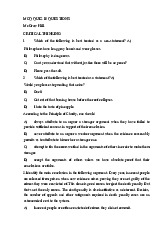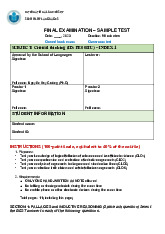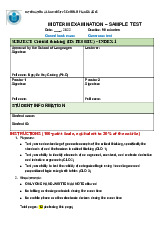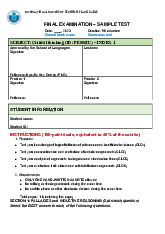


























Preview text:
9/17/2020 Critical Thinking Chapter 2 1 2 1 9/17/2020
"A fact is a thing that is occurred, to exist, or to be true."
Tell who, what, when, where, or how much.
Have a verifiable truth value.
Can be quantified and is specific.
Are supported by evidence.
Fact = việc, sự việc, sự kiện, thực tế 3 3
An opinion is a view about a particular issue. It is what the
person believes or thinks, and is not necessarily the truth. • Tend to be vague.
• Are personal beliefs or value judgments. 4 4 2 9/17/2020
• Fact = Can be proved or disproved • Opinion = Personal Belief 5 5 Fact Opinion
Hanoi is the capital of Hanoi is the best city in Vietnam. the world. IU is a University in I love studying at IU. Vietnam. 6 6 3 9/17/2020 7 7
• A definite or clear expression of something in speech or writing.
• A statement is a sentence that can be viewed as either true or false.
• A statement is a sentence that makes good
grammatical sense when it is prefaced with the words
"It is true that…" or "It is false that…“. 8 8 4 9/17/2020
Four things should be noted about statements.
1. First, a sentence may be used to express more than one statement.
Example: Roses are red and violets are blue
This sentence expresses two distinct statements (“roses
are red” and “violets are blue”).
Each of these is a statement because each is capable of
standing alone as a declarative sentence. 9 9
Four things should be noted about statements.
1. First, a sentence may be used to express more than one statement.
Example: Roses are red and violets are blue
This sentence expresses two distinct statements
(“roses are red” and “violets are blue”).
Each of these is a statement because each is
capable of standing alone as a declarative sentence. 10 10 5 9/17/2020
Second, a statement can sometimes be
expressed as a phrase or an incomplete clause,
rather than as a complete declarative sentence.
Example: Considering Ian's near-perfect SAT scores,
he should be able to get into an Ivy League college.
• The phrase "considering Ian's near-perfect SAT scores" is a dependent clause;
• The intent of the speaker or writer is clearly to defend one
claim on the basis of another;
• It is important to recognize that there are two statements in this passage, rather than one. 11 11
Third, not all sentences are statements, that is, sentences
that either assert or deny that something is the case. • What time is it? (question) • Hi, Dad! (greeting) • Close the window! (command) •
Please send me your current catalog. (request) •
Let’s go to Paris for our anniversary. (proposal) •
Insert tab A into slot B. (instruction) •
Oh, my goodness! (exclamation)
None says, in effect, “This is a fact. Accept this; it is true.”
Consequently, sentences like these are not parts of arguments. 12 12 6 9/17/2020
Finally, statements can be about subjective matters of
personal experience as well as objectively verifiable matters of fact.
If I say, for example, I feel a slight twinge in my left knee
This is a statement because it is either true or false (I might
be lying, after all), even though other people may have no
way of verifying whether I am telling the truth. 13 13
• Rhetorical questions are sentences that have the
grammatical form of questions but are meant to be understood as assertions.
• “Alyssa, you should quit smoking. Don’t you realize how
bad that is for your health?” “smoking is bad for your health”
• Not to ask for information, but to make a positive
assertion that the speaker or writer expects at least some
of his readers or listeners to agree with.
• For that reason, rhetorical questions should be treated
as statements rather than as questions. 14 14 7 9/17/2020
• Ought imperatives should be regarded as statements.
• They have the grammatical form of imperatives but are
intended to be understood as “ought statements”:
express a judgment about what ought to be done.
• Example: “Do not read beauty magazine. They will only make you feel ugly.”
• It is an advice or value judgments, not a command.
• Implication “You shouldn’t read beauty magazine.” 15 15
More tricky statement examples
• Don’t you know smoking will kill you? Smoking will kill you.
• How am I supposed to do that? I can’t do that.
• Don’t blow dry your hair in the tub!
really means “You should not blow dry your hair in the tub.” 16 16 8 9/17/2020 Exercise 2.1
I. Determine whether, in typical contexts, the following sentences are or are not statements.
Can’t you see that pornography demeans women? Ans: Statement Why?
Rhetorical question: Everybody knows that pornography demeans women. 17 Exercise 2.1
I. Determine whether, in typical contexts, the following sentences are or are not statements.
Please print your name legibly. Ans: Nonstatement Why? request 18 9 9/17/2020 Exercise 2.1
I. Determine whether, in typical contexts, the following sentences are or are not statements.
What will it profit a man, if he gains the whole world
and forfeits his life? (Matt. 16:26) Ans: Statement Why? rhetorical question 19
Argument : some kind of quarrel or shouting match??? 20 20 10




